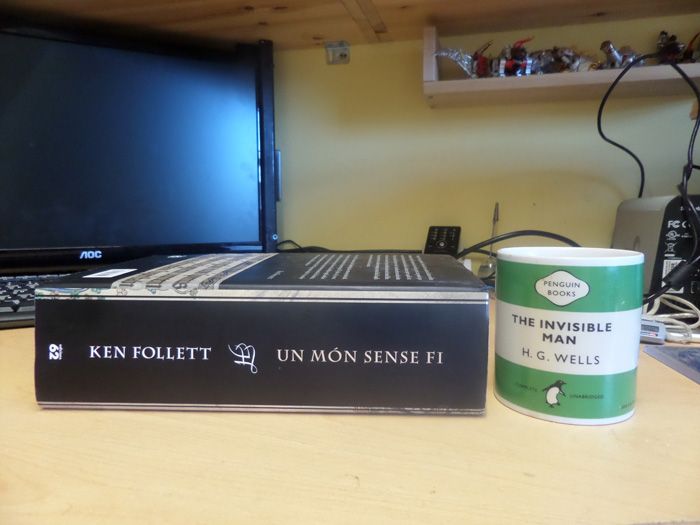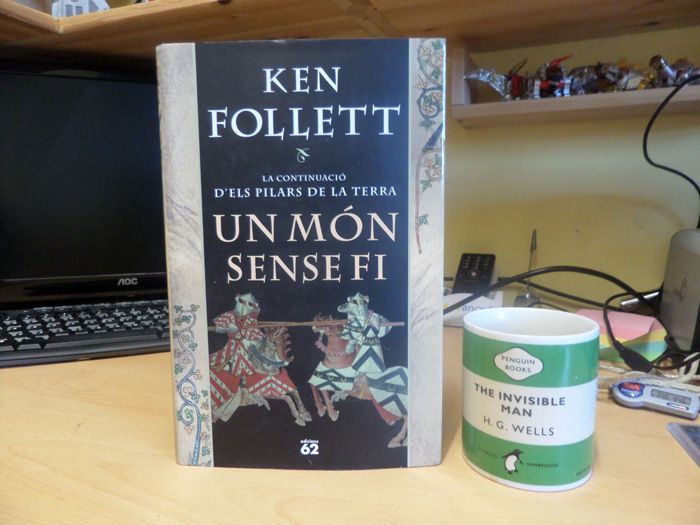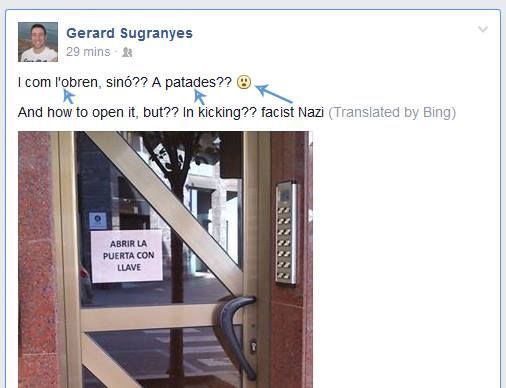60 messages over 8 pages: 1 2 3 4 5 6 7 8 Next >>
Meddysong
Triglot
Groupie
United Kingdom
timeofftakeoff.com
Joined 3615 days ago
56 posts - 84 votes 
Speaks: English*, Esperanto, French
Studies: Italian, Catalan
Studies: Swedish
| Message 1 of 60 14 January 2015 at 11:55pm | IP Logged |
Hello!
I'm Tim, other half of Radioclare and new member of Team Caesar.
My challenge is to learn Catalan. And the primary reason is to read a book that I asked Clare to buy me recently:

That is a huge book! It's nearly as thick as my tea mug!

It's colossal, one of the biggest books I own:

At nearly 1,300 pages in length it's not a project to be taken lightly. But I fully intend to read it. Unbelievably it was only £3.08 including postage.
Out of all the world's language groups I'm most familiar with the Romance branch and I know from a trip to Andorra, where Catalan is the official language, that I'm in a reasonably strong position. I didn't happen to know at the time what language was written everywhere but I could understand it, including when conversing with our taxi driver. The same was true when we were in Barcelona and I had to ask for directions, only to get a reply in Catalan, which presented no problems.
So my goal is an unusual one. I'm not learning in preparation for a holiday, and have no expectations of being able to write the language comfortably. And I certainly don't anticipate obtaining any sort of ability to speak it out loud. All I want to do is dip into the language and then in a few months' time, once I'm happy that I've absorbed the grammar, read my book. This thread will be where I keep track of what I'm doing.
I've recently started (courtesy of Santa Claus) reading in French and Italian again, and so I'll be mentioning them too in this thread.
At some point in the year I suspect I might try learning Romanian. Clare and I have visited most countries in Europe and, as much as is reasonable, try not to use English. If there's a language that belongs to a group that we know, then we sort of expect ourselves to be able to speak it. We haven't been to Bulgaria or Romania yet and I'm hoping to add those countries to our holiday plans for 2016. Clare's learning Macedonian this year, which will mean she's fine for Bulgaria. And since Romanian is a Romance language, that falls to me. I'm secretly really looking forward to it, in the hope that its Slavic features act as a gateway to that language family too.
3 persons have voted this message useful
| tarvos
Super Polyglot
Winner TAC 2012
Senior Member
China
likeapolyglot.wordpr
Joined 4715 days ago
5310 posts - 9399 votes    
Speaks: Dutch*, English, Swedish, French, Russian, German, Italian, Norwegian, Mandarin, Romanian, Afrikaans
Studies: Greek, Modern Hebrew, Spanish, Portuguese, Czech, Korean, Esperanto, Finnish
| Message 2 of 60 15 January 2015 at 12:00am | IP Logged |
As for Romanian the Slavic elements are mostly in the pronunciation and some of the
vocabulary (and some of the words are fairly literary - I got chastised for sounding
Moldovan when I used them).
However your French/Italian will come in very handy for Romanian, in my experience.
Romania is loads of fun, enjoy it.
1 person has voted this message useful
| Meddysong
Triglot
Groupie
United Kingdom
timeofftakeoff.com
Joined 3615 days ago
56 posts - 84 votes 
Speaks: English*, Esperanto, French
Studies: Italian, Catalan
Studies: Swedish
| Message 3 of 60 15 January 2015 at 12:02am | IP Logged |
My favourite Catalan anecdote in my limited experience of the language occurred a few months ago, when I saw something written on a Catalan friend's Facebook wall. I understood the sentiment perfectly, though wasn't sure of one particular word [potatoes? paws?], so accepted Bing's offer to translate it.
It didn't appear to think too highly of the smiley face:

4 persons have voted this message useful
| Meddysong
Triglot
Groupie
United Kingdom
timeofftakeoff.com
Joined 3615 days ago
56 posts - 84 votes 
Speaks: English*, Esperanto, French
Studies: Italian, Catalan
Studies: Swedish
| Message 4 of 60 15 January 2015 at 12:06am | IP Logged |
Hi, Tarvos -
The Slavic features that I was thinking about were the five cases that Romanian features, rather than the vocab. I understand what the cases are (I've dabbled with Russian, Croatian, German and a few other languages too) but was looking forward to some reinforcement in their use. That's a project for another day though :)
Edited by Meddysong on 15 January 2015 at 9:18am
1 person has voted this message useful
| tarvos
Super Polyglot
Winner TAC 2012
Senior Member
China
likeapolyglot.wordpr
Joined 4715 days ago
5310 posts - 9399 votes    
Speaks: Dutch*, English, Swedish, French, Russian, German, Italian, Norwegian, Mandarin, Romanian, Afrikaans
Studies: Greek, Modern Hebrew, Spanish, Portuguese, Czech, Korean, Esperanto, Finnish
| Message 5 of 60 15 January 2015 at 12:11am | IP Logged |
They officially have five cases but actually there are only three forms (nom/acc and
dat/gen are identical). And nobody in big cities uses the vocative very often, I think,
but you may encounter it in villages. I heard the vocative very often, but I didn't stay
in Bucharest. (I lived in Brasov). The cases actually have nothing to do with the Slavic
languages either - they're a remnant of Latin.
Edited by tarvos on 15 January 2015 at 12:11am
1 person has voted this message useful
| Meddysong
Triglot
Groupie
United Kingdom
timeofftakeoff.com
Joined 3615 days ago
56 posts - 84 votes 
Speaks: English*, Esperanto, French
Studies: Italian, Catalan
Studies: Swedish
| Message 6 of 60 15 January 2015 at 12:16am | IP Logged |
Oh sure, I get that - but since they've more or less disappeared from Latin's other descendants I've never had reason to work with them before. So theoretically good preparation for Slavic languages, as long as I accept that it's only with pronouns that there's a visible distinction :)
1 person has voted this message useful
| Crush
Tetraglot
Senior Member
ChinaRegistered users can see my Skype Name
Joined 5873 days ago
1622 posts - 2299 votes    
Speaks: English*, Spanish, Mandarin, Esperanto
Studies: Basque
| Message 7 of 60 15 January 2015 at 12:58am | IP Logged |
M'alegro de veure que hi ha un altra persona aquí aprenent el català! És una llengua meravellosa, molt bonica, amb moltes coses divertides quant tant a la gramàtica com a la literatura. Et desitjo molt d'èxit!
Quant a la paraula "patades", la forma singular és "patada". No sé si saps el castellà, però vol dir "(a) kick". Obrir-la "a patades" vol dir que utilitzas una "patada" per obrir la porta (en lloc d'obrir-la amb la clau).
3 persons have voted this message useful
| Meddysong
Triglot
Groupie
United Kingdom
timeofftakeoff.com
Joined 3615 days ago
56 posts - 84 votes 
Speaks: English*, Esperanto, French
Studies: Italian, Catalan
Studies: Swedish
| Message 8 of 60 17 January 2015 at 4:31pm | IP Logged |
I dipped my toe into Catalan for the first time today. Well, I'd already read the first page of my book and the author's comments, just for curiosity's sake, so that's not exactly true. That was enough for me to identify something unexpected, unless I'm misunderstanding something. It seems that in Catalan the structure "go + infinitive", unlike in English and the other Romance languaages, forms a past tense. I find that sort of thing fascinating.
Anyway, back to the subject. I did my first bit of homework today, reading the first section of Catalan: A Comprehensive Grammar, which was about the gender of nouns. I find that a curious starting-point; I don't necessarily know how to pronounce the words that I'm reading so would've preferred to start with the alphabet. That said, the preface indicates an assumption that the reader already has some familiarity with the language, hence the omission. That's something I need to investigate, then!
There wasn't much in the way of surprises for me with the chapter on gender. It follows the standard Romance model, with the same sort of exceptions from the broader rules. I did pick up, though, that the title of my book, Un món sense fi, could be interpreted a different way. It's a world without end but owing to the lack on an article at the end, we could assume that it's a masculine word fi rather than the feminine one that it actually is and translate it as a pointless world (=a world without an objective). So that's today's grammar-nerding :)
That's chapter 1 of 37. This is the sort of thing I can see myself dipping into a fair bit. I might even do a bit later. But I'm feeling tempted to start a book in Italian. Hmm ...
3 persons have voted this message useful
|
This discussion contains 60 messages over 8 pages: 1 2 3 4 5 6 7 8 Next >>
You cannot post new topics in this forum - You cannot reply to topics in this forum - You cannot delete your posts in this forum
You cannot edit your posts in this forum - You cannot create polls in this forum - You cannot vote in polls in this forum
This page was generated in 0.4844 seconds.
DHTML Menu By Milonic JavaScript
|










